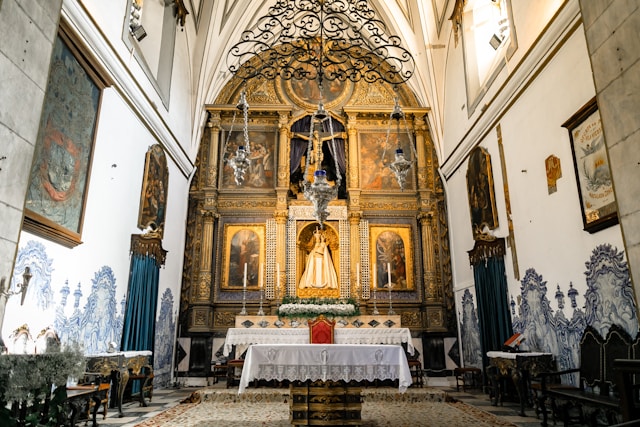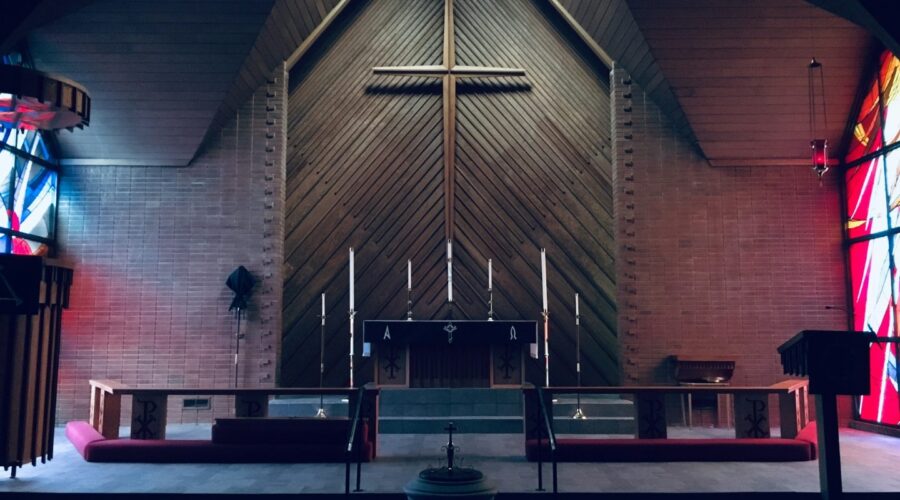Your cart is currently empty!
Month: July 2024

Unlocking the Grace of Fellowship: A Comprehensive Guide
Introduction
Grace fellowship, a cornerstone of Christian faith, is a transformative experience that fosters spiritual growth, unity, and encouragement. It encompasses the profound connection between believers, offering support, accountability, and a sense of belonging. This comprehensive guide delves into the multifaceted nature of grace fellowship, exploring its significance, benefits, and practical ways to cultivate it.
The Significance of Grace Fellowship
1. Cultivating Spiritual Growth
Fellowship with other believers provides a fertile ground for spiritual development. Through shared experiences, Bible study, and prayer, individuals can challenge and encourage one another’s faith, deepening their understanding of God and His Word.
2. Promoting Unity and Harmony
The bond of grace fellowship transcends individual differences and unites believers in a common purpose. It cultivates a sense of harmony and cooperation, where conflicts are resolved through mutual respect and understanding.
3. Sharing Burdens and Joys
Life’s trials and triumphs become lighter when shared with fellow believers. Fellowship provides a safe space to confide in one another, offer encouragement, and uplift each other through prayer and support.
The Benefits of Grace Fellowship
1. Increased Accountability
Surrounding oneself with individuals who share similar values provides a gentle form of accountability. Fellowship members can hold each other accountable for their actions, offering constructive criticism and support to help each other stay on the right path.
2. Enhanced Prayer Power
When believers pray together, their collective faith has a powerful impact. Fellowship gatherings offer opportunities for united prayer, where requests are lifted up and answered through the power of intercession.
3. Spiritual Protection and Nurture
Fellowship creates a protective environment against spiritual pitfalls and temptations. Members provide support and encouragement, reminding each other of God’s provision and guidance.
Cultivating Grace Fellowship
1. Intentional Participation
Grace fellowship doesn’t happen by chance; it requires intentionality. Make an effort to connect with other believers through regular gatherings, Bible studies, and prayer meetings.
2. Openness and Transparency
Cultivating fellowship involves sharing openly and honestly about our struggles, needs, and triumphs. Vulnerability fosters trust and builds deeper connections.
3. Acceptance and Inclusivity
Grace fellowship welcomes and embraces all believers, regardless of their background or differences. Embrace diversity and show love and respect to all.
Practical Ways to Foster Fellowship
1. Small Group Gatherings
Small groups provide an intimate setting for deeper fellowship and spiritual growth. They allow for personal sharing, prayer, and Bible study.
2. Church Activities and Outreach
Participating in church events and community outreach programs creates opportunities for connection and service. Shared experiences strengthen the bond of fellowship.
3. Technology for Fellowship
While in-person gatherings are ideal, technology can facilitate fellowship when distance or circumstances hinder it. Use video conferencing, social media, and messaging apps to stay connected.
Conclusion
Grace fellowship is an invaluable aspect of Christian life, offering spiritual growth, unity, and support. By intentionally cultivating it through openness, acceptance, and shared experiences, believers can experience the transformative power of this profound connection. Remember that fellowship is not merely a pleasant gathering but a vital element for our spiritual well-being and the advancement of God’s kingdom.

Discover the Richness of Orthodox Christianity: A Comprehensive Guide to History, Beliefs, and Practices
Introduction
Orthodox Christianity, an ancient and vibrant branch of Christianity, holds a profound spiritual and cultural significance for millions worldwide. Its history, beliefs, and practices offer a rich tapestry of tradition, faith, and community. In this comprehensive guide, we will delve into the depths of Orthodox Christianity, exploring its origins, theology, liturgical practices, and spiritual disciplines.
History of Orthodox Christianity
The roots of Orthodox Christianity can be traced back to the first century A.D. and the teachings of Jesus Christ. Early Christian communities spread throughout the Roman Empire, and the Orthodox tradition developed as a distinct branch in the East. The Great Schism of 1054 A.D. separated the Orthodox Church from the Western (Catholic) Church over theological and ecclesiastical differences.
Key Events in Orthodox History
- 1st century A.D.: Birth of Jesus Christ and the establishment of the early Christian Church.
- 4th-7th centuries: Ecumenical councils establish foundational doctrines and practices.
- 1054 A.D.: Great Schism separates the Orthodox and Catholic Churches.
- 11th-15th centuries: Byzantine Empire as the center of Orthodox Christianity.
- 16th-20th centuries: Russian Orthodox Church’s expansion and influence.
Beliefs and Theology
Orthodox Christianity is based on the teachings of the Bible, the writings of the Church Fathers, and the decisions of Ecumenical Councils. Its core beliefs include:
- The Holy Trinity: God as Father, Son (Jesus Christ), and Holy Spirit.
- The Incarnation: Jesus Christ as both human and divine.
- The Resurrection: Jesus Christ’s victory over death and sin.
- The Church: A visible and invisible community of believers, guided by bishops and priests.
- The Sacraments: Seven essential rites that convey God’s grace (Baptism, Confirmation, Eucharist, Confession, Anointing of the Sick, Holy Orders, Marriage).
Liturgical Practices
Orthodox worship is centered on the Divine Liturgy, a central act of communal worship. It involves:
- Prayer and hymns
- Scripture readings
- Sermon
- Eucharist (Holy Communion)
- Liturgical calendar with feasts and fasts
Features of Orthodox Liturgy
- Use of icons and vestments
- Emphasis on community and participation
- Symbolism and allegory throughout
- Incense and ritual gestures
- Liturgical language (often Greek or Old Church Slavonic)
Spiritual Disciplines
Orthodox Christianity emphasizes a life of prayer, fasting, and almsgiving as means of spiritual growth. Key spiritual disciplines include:
- Prayer: Regular and sustained conversations with God.
- Fasting: Abstinence from food and drink for spiritual purification.
- Almsgiving: Charitable acts towards those in need.
- Pilgrimage: Journeys to holy sites for spiritual enrichment.
- Monasticism: A life of dedication to God in a community setting.
Benefits of Spiritual Disciplines
- Cultivate a deeper relationship with God.
- Strengthen self-discipline and humility.
- Purify the mind and heart.
- Open one to the presence of the Holy Spirit.
- Prepare for eternal life.
Modern Orthodox Christianity
Today, Orthodox Christianity is practiced by millions worldwide, with major concentrations in Eastern Europe, the Middle East, and North America. It faces challenges related to globalization, secularism, and interfaith dialogue. However, Orthodox Christianity continues to offer a profound and enriching spiritual path, rooted in tradition and open to contemporary realities.
Contemporary Issues and Challenges
- Preserving tradition while adapting to changing cultural landscapes.
- Addressing social issues such as poverty, inequality, and environmental degradation.
- Promoting interfaith dialogue and cooperation.
- Nurturing youth and young adult involvement.
- Responding to the challenges of modern science and technology.
Conclusion
Orthodox Christianity stands as a formidable pillar of Christian tradition, with a rich history, profound beliefs, captivating liturgical practices, and transformative spiritual disciplines. Its teachings and practices offer a path to a deeper connection with God, communal worship, and a life of meaning and purpose. Whether you are a curious seeker, a devout believer, or simply seeking to expand your knowledge, the world of Orthodox Christianity beckons you to explore its timeless truths and eternal wisdom.

Find Your Spiritual Home: A Guide to Community Churches Near You
Discover the Warmth and Connection
Community churches are beacons of faith, fellowship, and service, offering a welcoming embrace to all who seek a spiritual home. They foster a sense of belonging where individuals can connect with like-minded people, grow in their faith, and make a meaningful contribution to their community.
Benefits of Joining a Community Church
- Strong Sense of Community: Meet new friends, build lasting relationships, and feel a sense of belonging in a supportive environment.
- Spiritual Growth: Engage in regular worship services, Bible studies, and prayer groups to deepen your understanding of God and your faith.
- Service Opportunities: Serve your community through outreach programs, volunteering activities, and mission trips.
- Personal Support: Receive guidance and support from pastors, elders, and other members during challenging times or personal milestones.
li>Family-Friendly Atmosphere: Many community churches offer children’s programs, youth groups, and events that cater to families of all ages.
How to Find a Compatible Community Church
Consider Your Values and Beliefs
Identify the core values and beliefs that are important to you in a church community. Consider your stance on issues such as worship style, theological perspectives, and social justice.
Research Online
Use online directories, search engines, and social media to find churches in your area. Read their websites, mission statements, and visitor information to gain an understanding of their values and offerings.
Attend Services
The best way to experience a church is to attend services in person. Pay attention to the worship atmosphere, the sermon, and the interactions between members. This will give you a firsthand impression of the community’s culture and whether it’s a good fit for you.
Talk to Members
Don’t hesitate to approach members after services or at special events. Ask questions about their experiences, the church’s history, and the community’s involvement. Their insights can provide valuable information.
What to Look for in a Community Church
Nurturing Spiritual Growth
Church services should be uplifting, inspiring, and provide opportunities for spiritual reflection and development.
Strong Community Engagement
Seek a church that actively involves its members in service to the community through outreach programs, volunteering, and mission trips.
Leadership Integrity
The pastor and church leaders should be trustworthy, ethical, and transparent in their roles. They should demonstrate a commitment to the community and its well-being.
Financial Transparency
The church should be open and accountable about its finances. Members should have access to financial statements and be informed of how their contributions are used.
Inclusivity and Diversity
Choose a church that embraces people of all backgrounds, ages, and abilities. Inclusivity fosters a welcoming and supportive environment.
Table of Local Community Churches
Name Location Website Worship Times Grace Community Church 123 Main Street gracecommunitychurch.org 9:30am & 11:00am St. Mary’s Catholic Church 456 Church Street stmaryscatholicchurch.org 7:00am, 9:00am, & 11:00am Hillside Presbyterian Church 789 Hillside Road hillsidepresbyterian.org 10:00am & 5:00pm Tips for Finding the Right Fit
- Be Patient: Finding the right community church takes time and effort. Attend several services and meet with different people before making a decision.
- Follow Your Instincts: Trust your gut feeling when choosing a church. If you feel welcome, inspired, and supported, it’s likely a good match.
- Don’t Be Afraid to Ask Questions: Don’t hesitate to ask the pastor or church leaders about anything that’s important to you or that you’re curious about.
- Get Involved: The best way to experience the community and build relationships is to participate in church activities and volunteer your time.
Finding a community church near you can be a transformative experience. By following these tips and considering the key aspects discussed in this guide, you can discover a spiritual home that nourishes your faith, connects you with others, and empowers you to make a positive impact in your community and the world.

Communion: A Sacrament Rooted in Faith and Fellowship
Introduction
Communion, also known as the Lord’s Supper or Eucharist, is a central sacrament in Christianity. It represents the remembrance and celebration of Jesus Christ’s death and resurrection and serves as a profound expression of faith and unity among believers. This blog post aims to provide a comprehensive guide to communion, exploring its history, significance, and the practical aspects of its observance.
Historical Context
The origins of communion can be traced back to the Last Supper, where Jesus shared bread and wine with his disciples. According to the Gospels, Jesus instructed them to continue this practice in remembrance of his sacrifice (Luke 22:14-20). The early church adopted communion as a regular part of its worship services, with bread and wine symbolizing the body and blood of Christ.
Theological Significance
A Remembrance of Christ’s Sacrifice
Communion is primarily a remembrance of Jesus Christ’s death on the cross. By partaking in bread and wine, believers recall the sacrifice Jesus made for their sins, acknowledging their dependence on his redemption.
A Renewal of the Covenant
Communion represents a renewal of the covenant between God and his people. It serves as a reminder of God’s faithfulness and the redemption he has provided through Christ.
A Symbol of Unity
Communion fosters unity among believers. As they partake in the same meal, they are reminded of their common faith and their membership in the Christian community. It is a sign of reconciliation, forgiveness, and the shared hope in Christ.
Practical Aspects of Communion
Frequency and Form
The frequency and form of communion vary among Christian denominations. Some churches practice weekly communion, while others observe it monthly or even less frequently. The form of communion also differs, with some using bread and grape juice, while others use wafers and wine.
Preparation
Proper preparation is essential before receiving communion. This may involve spiritual examination, repentance, and a time of prayer and reflection.
Reverence and Respect
Communion should be approached with reverence and respect. It is a sacred act that requires participants to be in a state of grace and to approach the table with a humble and thankful heart.
Different Perspectives on Communion
Catholicism
In Catholicism, communion is considered a sacramental meal that brings participants into a closer relationship with Christ. It is believed that the bread and wine are transformed into the actual body and blood of Christ through the act of consecration.
Orthodox Christianity
Orthodox Christians view communion as a holy mystery that connects them to God. They believe that the bread and wine undergo a spiritual transformation, making them the body and blood of Christ, although not in a literal sense.
Protestantism
Protestants interpret communion differently. Some denominations, such as Lutherans, believe that the bread and wine are the “real presence” of Christ, while others, such as Presbyterians, view them as symbols of his body and blood.
Tips for Meaningful Communion
- Prepare your heart through prayer and reflection.
- Approach the table with humility and a thankful spirit.
- Focus on the significance of the sacrament and its connection to Christ’s sacrifice.
- Use communion as a time to deepen your faith and fellowship with other believers.
- Regularly participate in communion to strengthen your relationship with Christ and the Christian community.
Conclusion
Communion is a sacrament that holds immense theological significance and practical implications in the Christian faith. It is a remembrance of Christ’s sacrifice, a renewal of the covenant, and a powerful symbol of unity. By approaching communion with reverence and preparation, believers can experience a profound encounter with God and deepen their connection with the Christian community.
May this comprehensive guide provide valuable insights and inspire a greater understanding of this sacred practice.

Discover the Enchanting Story of Saint Nicholas: The Origin of Santa Claus and Its Timeless Legacy
Introduction: The Legend of Saint Nicholas
Saint Nicholas, a beloved figure from ancient times, has captivated hearts for centuries. His legendary deeds of kindness and generosity have inspired countless tales and traditions, including the modern-day figure of Santa Claus.
This blog post will delve into the fascinating story of Saint Nicholas, tracing his origins, exploring his miraculous acts, and uncovering the enduring legacy he left behind.
Origins and Early Life
Born into a wealthy family in the 3rd century AD in Patara, Lycia (modern-day Turkey), Saint Nicholas displayed extraordinary compassion from a young age. While historical records are limited, legends recount his unwavering faith and generous spirit.
Miraculous Acts
- The Dowry Gift: In one famous story, Nicholas provided a dowry for three impoverished sisters, enabling them to marry and avoid a life of prostitution.
- The Grain Ship: During a famine, Nicholas is said to have calmed a violent storm and miraculously filled a ship with grain, saving a starving population.
- The Resurrection of Three Children: Legend tells of Nicholas resurrecting three children who had been unjustly murdered and dismembered.
Episcopacy and Legacy
Saint Nicholas became the Bishop of Myra, where he continued his unwavering advocacy for the poor and oppressed. His reputation for righteousness and generosity grew far and wide, earning him the title of “Wonderworker.”
Upon his death in the 4th century AD, Saint Nicholas was canonized as a saint. His feast day, December 6th, became a major celebration, marked by gift-giving and acts of kindness.
The Evolution of Santa Claus
Over the centuries, Saint Nicholas’s image underwent a gradual transformation. In the 13th century Netherlands, he was known as “Sinterklaas,” a patron saint of children who brought gifts on his feast day.
In the 19th century, Washington Irving’s “A History of New York” introduced the Dutch Sinterklaas to American audiences. Thomas Nast, an influential political cartoonist, popularized the modern-day image of Santa Claus as a jolly, bearded man in a red suit.
The Enduring Legacy of Saint Nicholas
Saint Nicholas’s legacy extends far beyond the Christmas season. His spirit of compassion and generosity continues to inspire people worldwide.
Modern-Day Celebrations
- Feast of Saint Nicholas (December 6th): This day is celebrated with gift-giving, special treats, and acts of kindness.
- Sinterklaas Day (December 5th): In the Netherlands and Belgium, Sinterklaas arrives on a white horse, accompanied by his helpers known as “Zwarte Pieten” (Black Peters).
Organizations and Charities
- The Salvation Army: Founded in 1865, this international organization provides food, shelter, and other services to those in need, inspired by Saint Nicholas’s example.
- Operation Santa Claus: This U.S. Postal Service program allows the public to fulfill Christmas wish lists for children from underprivileged families.
Conclusion
Saint Nicholas, the Wonderworker, has left an indelible mark on history. His story of kindness, generosity, and unwavering faith continues to inspire and spread joy around the world. From the origins of Santa Claus to modern-day charitable endeavors, Saint Nicholas’s legacy remains a testament to the transformative power of compassion.
As we celebrate the spirit of giving this holiday season, let us remember the true essence of Saint Nicholas and strive to emulate his unwavering commitment to helping others.

Unveiling the World Harvest Church: A Comprehensive Guide
Introduction
World Harvest Church (WHC) is a charismatic Christian megachurch headquartered in Columbus, Ohio. Founded in 1972 by Pastor Rodney Howard-Browne, WHC has grown into a global movement with churches and ministries in over 100 countries. This blog post aims to provide a comprehensive overview of WHC, exploring its history, beliefs, practices, and global impact.
History
Beginnings
In 1972, Pastor Rodney Howard-Browne established WHC in South Africa as a small Bible study group. The church rapidly grew due to its emphasis on healing and miracles.
Global Expansion
In the 1980s and 1990s, WHC began expanding internationally, establishing churches in Europe, Asia, and the Americas. The church’s focus on revival and outreach played a significant role in its global growth.
Move to the United States
In 2003, WHC’s headquarters moved to Columbus, Ohio, becoming one of the largest churches in the Midwest. The church has continued to grow and flourish, expanding its ministries and outreach programs.
Beliefs
Core Tenets
- The Trinity: God the Father, Jesus Christ the Son, and the Holy Spirit
- The Bible: Inerrant and the sole authority for faith and practice
- Salvation: By grace through faith in Jesus Christ
- The Holy Spirit: Empowers believers with gifts and empowers miracles
- Healing: Supernatural healing is available to all believers
Controversial Teachings
WHC has been involved in controversies over its stance on certain issues, such as:
- Healing Claims: The church’s emphasis on healing has been criticized by some medical professionals.
- Financial Practices: WHC has faced questions regarding its financial practices and use of donations.
- Demonization: The church’s belief in demonization has been debated by other Christian denominations.
Practices
Worship Services
WHC’s worship services are characterized by:
- Charismatic Music: Lively and emotional music with a focus on praise and worship
- Spirit-Filled Atmosphere: An emphasis on supernatural manifestations, such as speaking in tongues and prophecy
- Teachings: Preaching and Bible study that emphasize spiritual growth, healing, and evangelism
Ministries
WHC operates various ministries, including:
- Revival Center: A central hub for healing and prayer
- World Harvest Bible College: Provides theological education and training
- World Harvest Missionary Outreach: Supports missions in developing countries
- World Harvest Media: Produces and distributes Christian content
Global Impact
WHC has made a significant impact globally:
- Church Planting: Established over 1,000 churches worldwide
- Missionary Work: Supports over 500 missionaries in various countries
- Charitable Programs: Provides humanitarian aid, disaster relief, and community outreach
- Leadership Training: Conducts conferences and seminars to equip Christian leaders
Additional Information
Website and Social Media
To learn more about WHC, visit its website at www.worldharvestchurch.org. The church also maintains active social media pages on Facebook, Twitter, and Instagram.
Controversies and Criticism
WHC has faced criticism and controversies throughout its history. For more information on these issues, refer to the following resources:
- Religion News Service: World Harvest Church’s Colonel Sanders Connection
- The Christian Post: World Harvest Church Faces Lawsuit Over Abuse
- Patheos: The World Harvest Church: A Critical Look
Conclusion
World Harvest Church is a multifaceted organization with a significant impact on the global Christian landscape. From its humble beginnings as a Bible study group to its present status as a global megachurch, WHC’s journey has been marked by growth, controversy, and spiritual renewal. Whether you agree with its teachings or not, WHC’s commitment to spreading the Gospel and its emphasis on healing and miracles continue to inspire and challenge believers worldwide.

Meet the Pastor of Bellevue Baptist Church: A Beacon of Faith and Inspiration
Bellevue Baptist Church, known for its vibrant congregation and unwavering commitment to community outreach, is led by a pastor who embodies the very essence of spiritual leadership. Let us delve into the life and ministry of the esteemed pastor of Bellevue Baptist Church.
A Life Dedicated to Faith and Service
Dr. Steve Gaines, the esteemed pastor of Bellevue Baptist Church, embarked on his spiritual journey at an early age. Ordained to ministry in 1983, Dr. Gaines has served in various pastoral roles before assuming the leadership of Bellevue Baptist Church in 2005.
Dr. Gaines’ passion for ministry and unwavering faith have guided him throughout his life. His sermons, marked by their biblical depth and practical application, have resonated with countless individuals, inspiring them to grow in their faith and make a positive impact on their communities.
Leadership at Bellevue Baptist Church
Under Dr. Gaines’ leadership, Bellevue Baptist Church has flourished into a thriving spiritual community. With a weekly attendance of over 30,000, the church has become a beacon of hope and a catalyst for positive change in the Memphis area and beyond.
Dr. Gaines’ vision for Bellevue Baptist Church extends far beyond its walls. The church actively engages in local and international missions, providing humanitarian aid, supporting educational initiatives, and sharing the Gospel with those who have yet to experience its transformative power.
Impactful Ministries
- The Gathering: A weekly worship service that attracts thousands of attendees, featuring powerful music and inspiring messages that uplift and strengthen believers.
- LifeGroups: Small group gatherings that foster spiritual growth, community building, and accountability among members.
- Missions: Bellevue Baptist Church supports over 100 missionaries around the world, engaging in evangelism, humanitarian aid, and educational initiatives.
A Role Model for Spiritual Leaders
Beyond his pastoral responsibilities, Dr. Gaines serves as a mentor and guide for aspiring pastors and Christian leaders. His wisdom, compassion, and unwavering commitment to excellence have inspired countless individuals to pursue their calling with passion and integrity.
Dr. Gaines is actively involved in the Southern Baptist Convention, serving on various committees and boards. His leadership extends beyond the walls of Bellevue Baptist Church, as he seeks to promote unity and cooperation among Christian leaders and congregations.
Connect with Bellevue Baptist Church
To learn more about Bellevue Baptist Church and Dr. Steve Gaines’ ministry, visit the church’s website at https://www.bellevue.org/.
You can also follow Bellevue Baptist Church on social media for updates on upcoming events, sermons, and opportunities to get involved in the church’s vibrant community:
- Facebook: https://www.facebook.com/bellevuebaptistchurch/
- Instagram: https://www.instagram.com/bellevuebaptist/
- Twitter: https://twitter.com/bellevuebaptist
Conclusion
The pastor of Bellevue Baptist Church, Dr. Steve Gaines, is a testament to the transformative power of faith and dedicated service. His leadership has guided the church to become a beacon of hope, a catalyst for positive change, and a nurturing community for believers. As we continue to navigate the challenges and opportunities of our time, Dr. Gaines’ unwavering conviction and inspiring messages provide a guiding light for all who seek to live a life of purpose and impact.

Community Church: A Welcoming and Inclusive Spiritual Haven
What is a Community Church?
A community church is a congregation that emphasizes the involvement and participation of its members in fostering a welcoming and inclusive faith community. Unlike traditional denominations, community churches often prioritize spiritual exploration, personal growth, and service above strict adherence to any particular creed or doctrine.
Key Characteristics of Community Churches:
Flexible Beliefs and Practices:
- Community churches often adopt a liberal approach to religious beliefs and practices.
- They may welcome individuals from diverse backgrounds, perspectives, and faith traditions.
- Worship services can vary significantly, embracing contemporary music, traditional hymns, and open discussion formats.
Member Involvement and Leadership:
- Community churches encourage active participation from all members.
- Members often share responsibilities for planning worship services, leading discussions, and organizing community events.
- Leadership is typically shared among a team of pastors, elders, and lay members.
Social Justice and Community Service:
- Many community churches prioritize social justice and outreach programs.
- They may organize volunteer initiatives, provide support services to those in need, and advocate for social change.
- Community involvement is an integral part of their mission.
Benefits of Joining a Community Church:
- Sense of belonging: Community churches foster a welcoming and inclusive environment where all members feel valued.
- Spiritual growth: Flexible and open-minded approaches encourage personal exploration and spiritual development.
- Community support: Members often provide a network of support, friendship, and connection.
- Social impact: Through community service and social justice initiatives, community churches make a positive impact on society.
- Leadership opportunities: Members have the chance to actively engage in leadership roles, contributing to the church’s direction and mission.
Types of Community Churches:
There is a wide range of community churches, each with its own unique characteristics:
Type Characteristics Metropolitan Community Church (MCC): Focuses on LGBTQ+ inclusion and activism. United Church of Christ (UCC): Protestant denomination known for its progressive theology and social justice work. Community of Christ: Reorganized branch of the Latter Day Saint movement, emphasizes peace, inclusivity, and interfaith dialogue. Independent Community Church: Not affiliated with any denomination, has its own unique beliefs and practices. Finding a Community Church:
- Online directories: Websites like Church Finder and FaithStreet provide listings of community churches nationwide.
- Community events: Attend local festivals, farmers’ markets, or community gatherings to connect with potential churches.
- Word of mouth: Ask friends, family, or coworkers if they know of any community churches in the area.
Tips for Getting Involved:
- Attend services: Visit a variety of community churches to find one that resonates with your beliefs and values.
- Introduce yourself: Speak to the pastor, staff, or members to introduce yourself and learn more about the church.
- Explore volunteer opportunities: Look for ways to get involved in the community by volunteering for various programs or initiatives.
- Join a small group: Many community churches offer small groups for prayer, discussion, or Bible study.
- Offer your skills: Share your talents or skills with the church community, such as music, teaching, or administrative support.
Conclusion:
Community churches provide a welcoming and inclusive spiritual home for those seeking a meaningful and engaged faith community. They embrace diversity, encourage member involvement, and prioritize social justice. By joining a community church, individuals can find a sense of belonging, grow spiritually, connect with others, and make a positive impact in their community and beyond.

Village Church Pastor Matt Chandler: A Comprehensive Guide
Who is Matt Chandler?
Matt Chandler is the lead pastor of The Village Church, a multi-site evangelical megachurch based in Flower Mound, Texas. He is known for his charismatic preaching style, biblical teaching, and emphasis on discipleship.
Early Life and Ministry
Chandler was born in Spokane, Washington, in 1974. He graduated from Liberty University in 1996 and Dallas Theological Seminary in 2002. After graduating, he became the youth pastor at Highland Park Presbyterian Church in Dallas.
In 2002, Chandler planted The Village Church with a small group of people in Highland Village, Texas. The church quickly grew and expanded to multiple campuses in the Dallas-Fort Worth area.
Theology and Teaching
Chandler’s theology is rooted in the Bible, particularly the Gospel of Jesus Christ. He emphasizes the importance of salvation through faith in Christ, the power of God’s grace, and the transformative role of the Holy Spirit.
Chandler’s preaching style is characterized by its clarity, humor, and personal stories. He uses a variety of illustrations and anecdotes to make complex theological concepts accessible to his audience.
Discipleship and Community
Chandler is passionate about discipleship and helping people grow in their faith. He believes that true discipleship is not just about head knowledge but about heart transformation.
The Village Church offers a variety of discipleship programs, including small groups, classes, and mentoring relationships. The church also emphasizes the importance of community and relationships, and encourages members to connect with one another.
Leadership and Influence
Chandler is a respected leader in the evangelical community. He has written several books, including “To Live Is Christ,” “Creature of the Word,” and “The Explicit Gospel.” He also hosts a popular podcast called “The Matt Chandler Show.”
Chandler’s influence extends beyond The Village Church. He is a sought-after speaker at conferences and events around the world. He has also been featured in numerous media outlets, including The New York Times, Christianity Today, and The Gospel Coalition.
Controversies and Critiques
Like many prominent Christian leaders, Chandler has not been without his share of controversies and critiques.
- Calvinism: Chandler holds a Calvinist theological perspective, which emphasizes God’s sovereignty and election. This has led to some criticism from those who believe that Calvinism is too deterministic.
- Social Issues: Chandler has expressed conservative views on social issues such as abortion and homosexuality. This has led to criticism from those who believe that his views are too narrow-minded.
- Leadership Style: Some have criticized Chandler’s leadership style, which they say is too authoritarian. They argue that he does not allow enough dissent or criticism within his church.
Conclusion
Matt Chandler is a complex and influential figure in the evangelical Christian community. He is a gifted preacher, a passionate disciple-maker, and a respected leader. While he has faced some controversies and critiques, his impact on countless lives has been undeniable.
Whether you agree with his theology or not, there is no denying that Chandler is a Christian leader who has made a significant contribution to the church and the world.

Discover the Church of Jesus Christ: Unveiling the Essence of Faith and Community
Introduction
The Church of Jesus Christ, also known as the LDS Church or Mormon Church, is a vibrant and multifaceted religious organization that has captured the attention of millions worldwide. Founded in 1830 by Joseph Smith Jr., the church has a rich history, unique beliefs, and a global reach that spans over 150 countries. In this comprehensive guide, we embark on a journey to explore the multifaceted nature of the Church of Jesus Christ, shedding light on its core principles, practices, and the impact it has on the lives of its members.
Core Beliefs and Principles
Divine Nature of God
- The LDS Church believes in a Godhead comprised of three distinct beings: God the Father, Jesus Christ, and the Holy Ghost.
- God the Father is seen as the Supreme Being, the Creator of all things.
- Jesus Christ is believed to be the literal Son of God and the Savior of mankind.
- The Holy Ghost is regarded as the third member of the Godhead, providing divine guidance and inspiration.
Plan of Salvation
- The church teaches that we existed as spirits before this mortal life and lived with God.
- God presented a plan for us to gain physical bodies, learn from earthly experiences, and progress towards eternal life.
- After this life, we will be resurrected and judged according to our actions and desires.
- The ultimate goal is to return to live with God and experience eternal joy.
Eternal Families
- The LDS Church emphasizes the importance of family relationships.
- It believes that marriage is an eternal covenant that extends beyond this mortal life.
- Families can be sealed together for eternity through temple ordinances.
Practices and Ordinances
Baptism
Baptism is a sacred ordinance that symbolizes the washing away of sins and the covenant to follow Jesus Christ.
Sacrament (Communion)
The sacrament is taken weekly as a reminder of Christ’s sacrifice and as a renewal of baptismal covenants.
Temple Ordinances
Temples are sacred buildings where members participate in ordinances such as marriage sealings, baptisms for the dead, and endowments.
Missionary Work
The LDS Church encourages its members to serve as missionaries, sharing their faith with others around the world.
Community and Service
The Church of Jesus Christ is deeply rooted in community and service. Here are a few notable aspects:
Lay Priesthood
- The church is led by a lay priesthood, meaning its leaders are unpaid volunteers.
- Priesthood holders serve in various callings, from bishops to teachers.
Welfare and Humanitarian Aid
- The church has a robust welfare system to assist members in need.
- It also provides humanitarian aid to communities around the globe.
Family History
- The church places great importance on family history and genealogy research.
- It has a vast network of resources available for members to explore their ancestry.
Conclusion
The Church of Jesus Christ is a complex and multifaceted religious organization that offers a unique blend of spiritual beliefs, practices, and community involvement. Its members find strength and purpose in their faith, striving to live Christ-centered lives while serving others. While this guide provides a comprehensive overview, there is always more to explore and discover about this dynamic and ever-evolving church. By delving deeper into its principles, practices, and history, we gain a greater appreciation for the transformative power of faith and the impact it can have on our lives and communities.

Discover the Profound Power of Saint Benedict’s Prayer: A Comprehensive Guide
Introduction
The Saint Benedict Prayer, also known as the Saint Benedict Medal Prayer, has been revered for centuries as a powerful prayer of protection and healing. Attributed to the founder of the Benedictine Order, Saint Benedict of Nursia, this prayer holds immense spiritual significance. In this comprehensive guide, we will explore the origins, meaning, and benefits of this timeless prayer, providing insights into its profound impact on the lives of countless individuals.
Origin and History
The Saint Benedict Prayer originated in the 6th century Italy, during the time of Saint Benedict of Nursia. Saint Benedict, known for his unwavering faith and dedication to monastic life, believed in the power of prayer as a means of spiritual growth and protection. According to legend, the prayer was inscribed on a medal that was distributed to members of the Benedictine Order and pilgrims seeking his blessings.
Saint Benedict’s Influence
Saint Benedict, a pioneer of Western monasticism, played a pivotal role in shaping Christian practices during his time. His emphasis on prayer, humility, and obedience left an enduring legacy that continues to inspire spiritual seekers to this day.
Meaning and Interpretation
The Saint Benedict Prayer is a powerful invocation of God’s protection, blessing, and healing. It begins with the invocation of the Holy Cross, a symbol of Christ’s victory over sin and death. The prayer then continues with a series of petitions, each addressing a specific need or concern.
Key Petitions
- Protection from evil
- Removal of temptation
- Healing of illness
- Protection against natural disasters
li>Safeguarding during travel
Benefits of Reciting the Saint Benedict Prayer
The Saint Benedict Prayer has been widely recited for centuries, with countless individuals experiencing its profound benefits. These include:
Protection and Safety
The prayer is believed to offer protection against physical and spiritual harm. Many have reported experiencing a sense of peace and safety while reciting it.
Healing and Recovery
The prayer is often used to invoke God’s healing power in times of illness or injury. Many have found solace and comfort in its recitation during difficult times.
Overcoming Temptation
The prayer includes a petition for protection against temptation. By reciting it, individuals seek God’s help in resisting evil and adhering to a righteous path.
Success and Prosperity
While not explicitly stated in the prayer, many believe it can bring success and prosperity in various aspects of life.
How to Recite the Saint Benedict Prayer
The Saint Benedict Prayer is typically recited orally or silently. One can choose a specific time or place for recitation, or incorporate it into their daily devotional practices. There are no strict rules regarding the frequency or manner of recitation.
Suggested Practice
Consider reciting the prayer upon waking, before meals, or at bedtime. You may also choose to recite it when facing challenges or seeking guidance.
Saint Benedict Medal
The Saint Benedict Medal is a physical representation of the prayer. It is typically worn as a pendant or carried on one’s person. The medal often bears the image of Saint Benedict, the Holy Cross, and various symbols related to the prayer.
Benefits of Wearing the Saint Benedict Medal
- Symbolic protection
- Reminder of the prayer
- Focus for meditation
- Spiritual connection to Saint Benedict
Conclusion
The Saint Benedict Prayer is a timeless spiritual treasure, offering a powerful connection to God’s protection, healing, and guidance. Reciting the prayer regularly or wearing the Saint Benedict Medal can bring numerous benefits, fostering a deeper connection to the divine and providing solace and support in times of need. Whether you are facing challenges, seeking inner peace, or simply desiring a closer relationship with God, the Saint Benedict Prayer is a profound tool to enhance your spiritual journey.

Church of Christ Near Me: Your Guide to Local Faith Communities
Introduction
The Church of Christ is a Christian denomination that emphasizes the importance of following the teachings of Jesus Christ as recorded in the Bible. With thousands of congregations worldwide, finding a “Church of Christ near me” is a common desire for individuals seeking a faith community that aligns with their beliefs. This comprehensive guide will provide you with valuable information and tips to help you locate a Church of Christ in your vicinity.
Why Choose the Church of Christ?
- Biblical Authority: The Church of Christ bases its beliefs and practices solely on the Bible, which it considers to be the inspired and authoritative Word of God.
- Congregational Autonomy: Each local congregation is self-governing and independent, without any central hierarchy or governing body.
- Simple Worship: Worship services typically include singing, prayer, preaching, and communion, focusing on simplicity and adherence to biblical patterns.
- Missionary Emphasis: The Church of Christ places a high value on evangelism and missions, seeking to spread the Christian message worldwide.
Finding a Church of Christ Near You
Online Directories
There are several online directories that provide listings of Churches of Christ across the country and around the world. Here are a few popular options:
Local Search Engines
You can also use local search engines like Google or Bing to find Churches of Christ in your area. Simply search for “Church of Christ near me” or “Churches of Christ in [Your City or Town]”.
Word-of-Mouth
Ask friends, family, or colleagues if they are familiar with any Churches of Christ in the area. Personal recommendations can be helpful in finding a congregation that fits your needs.
Tips for Visiting a Church of Christ
Attend a Worship Service
The best way to experience a Church of Christ is to attend a worship service. This will give you a firsthand look at the congregation’s worship style, message, and overall atmosphere.
Connect with Members
After the service, take some time to introduce yourself to members of the congregation. Share your interests and ask them about their experiences with the church.
Ask Questions
Don’t be afraid to ask questions about the church’s beliefs, practices, and mission. This will help you determine if the congregation is a good fit for you.
Conclusion
Finding a Church of Christ near you can be a rewarding experience. By utilizing online directories, local search engines, and personal recommendations, you can locate a congregation that aligns with your Christian beliefs and provides a supportive community. Remember to attend a worship service, connect with members, and ask questions to make an informed decision. May your journey lead you to a faith community where you can grow spiritually and serve others.